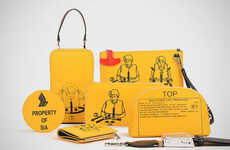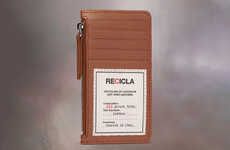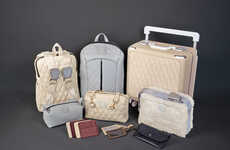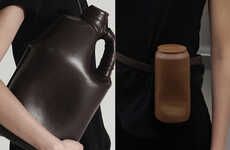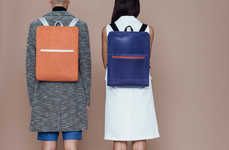
These Leather Handbags are Made Out of Recycled Conveyor Belts
Alyson Wyers — May 20, 2014 — Art & Design
These stylish leather handbags are made out of recycled conveyor belts. By transforming industrial waste into luxury goods, Kazmok upcycles conveyor belts previously used at shipping warehouses, postal offices, flower distribution centers and recycling facilities.
From Amsterdam based designer Dinand Stufkens, the Kazmok collection is made up of durable bags and accessories. The handbags are the result of the idea of making premium products out of discarded materials. While being elegant and stylish, the Kazmok line also helps the environment by reducing the amount of industrial waste ending up in landfills.
The recycled conveyor belts are being transformed not just into brief cases and handbags, but luggage and other accessories such as iPad cases and belts. Dinand hopes to expand the line, providing consumers with even more eco conversation pieces.
From Amsterdam based designer Dinand Stufkens, the Kazmok collection is made up of durable bags and accessories. The handbags are the result of the idea of making premium products out of discarded materials. While being elegant and stylish, the Kazmok line also helps the environment by reducing the amount of industrial waste ending up in landfills.
The recycled conveyor belts are being transformed not just into brief cases and handbags, but luggage and other accessories such as iPad cases and belts. Dinand hopes to expand the line, providing consumers with even more eco conversation pieces.
Trend Themes
1. Upcycling Industrial Waste - Transforming industrial waste into luxury goods through upcycling creates opportunities for companies looking for sustainable and innovative ways to produce premium products.
2. Eco-friendly Fashion - Sustainability in the fashion industry has gained momentum with the emergence of eco-friendly fashion brands, and creates an opportunity for companies looking to create luxury products without negatively impacting the environment.
3. Circular Economy - The circular economy model of waste reduction, reuse and recycling inspires companies to develop creative solutions to reduce industrial waste and maximize materials usage.
Industry Implications
1. Luxury Fashion - The luxury fashion industry can benefit from upcycling industrial waste into high-end products that are eco-friendly while still maintaining style, design, and exclusivity.
2. Sustainability - Sustainability is becoming a priority for companies across all industries. Upcycling industrial waste into luxury products can contribute to sustainable practices while generating unique selling points that appeal to consumers.
3. Waste Management - The waste management industry can collaborate with designers to find creative solutions that contribute to a circular economy and reduce industrial waste while promoting innovation and creativity.
3.8
Score
Popularity
Activity
Freshness




